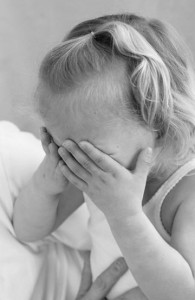
The New York Times asks: Can Preschoolers be Depressed?
“Mickey lies. Dreams don’t come true.”
With this heartbreaking quote, Pamela Paul (author of Parenting, Inc.) introduces Kiran, a little boy who was diagnosed with depression at age five. Paul’s article, Can Preschoolers be Depressed? (New York Times, 25 August 2010), raises a number of questions – the most pertinent to our blog being: if the answer is yes, how might a healthy lifestyle affect this condition? If the answer is no, what lifestyle habits (involving diet, exercise and/or spirituality) are contributing to the symptoms that sparked this debate? And how might a healthy lifestyle address these issues?
Several excerpts from the article:
“Is it really possible to diagnose such a grown-up affliction in such a young child? And is diagnosing clinical depression in a preschooler a good idea, or are children that young too immature, too changeable, too temperamental to be laden with such a momentous label? Preschool depression may be a legitimate ailment, one that could gain traction with parents in the way that attention deficit hyperactivity disorder (A.D.H.D.) and oppositional defiant disorder (O.D.D.) — afflictions few people heard of 30 years ago — have entered the what-to-worry-about lexicon. But when the rate of development among children varies so widely and burgeoning personalities are still in flux, how can we know at what point a child crosses the line from altogether unremarkable to somewhat different to clinically disordered? Just how early can depression begin?”
Joan Luby, a professor of child psychiatry at Washington University School of Medicine, diagnosed Kiran and – while she admits “the idea is threatening”- stands by her view that children can be depressed before they’re even old enough for school. Although “a number of child psychiatrists and developmental psychologists say depression can surface in children as young as 2 or 3,” many in the field are hesitant to agree. As Paul explains, “Classifying preschool depression as a medical disorder carries a risk of disease-mongering.”
“Given the influence of Big Pharma, we have to be sure that every time a child’s ice cream falls off the cone and he cries, we don’t label him depressed,” cautions Rahil Briggs, an infant-toddler psychologist at Children’s Hospital at Montefiore in New York. Though research does not support the use of antidepressants in children this young, medication of preschoolers, often off label, is on the rise. One child psychologist told me about a conference he attended where he met frustrated drug-industry representatives. “They want to give these kids medicines, but we can’t figure out the diagnoses.”
However, Luby and others point to benefits of preschool diagnoses:
“…recent successes in treating autism have also shown that in many cases, the earlier the detection and intervention of a disorder, the greater chance for significant results. One principal argument for diagnosing depression early is that even with a genetic predisposition, depression isn’t cemented into the psyche; the very fluidity of preschoolers’ mental states seems to make them more treatable. This window is especially tantalizing because of the brain’s neuroplasticity during the early years. “
But, as Paul points out, “Generally speaking, preschool depression, unlike autism, O.D.D. and A.D.H.D., which have clear symptoms, is not a disorder that is readily apparent to the casual observer or even to the concerned parent.” Regardless, Helen Egger (a Duke University child psychiatrist and epidemiologist) and other researchers claim that 84,000 of America’s 6 million preschoolers may be clinically depressed.
To read more on this debate, check out Paul’s full article in the New York Times. If you have an opinion on the topic, pleasefeel free to add your comments below!


Leave a Reply